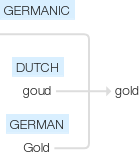Gold
Old English, of Germanic origin; related to Dutch goud and German Gold, from an Indo-European root shared by yellow.
wiktionary
From Middle English gold, from Old English gold(“gold”), from Proto-Germanic *gulþą(“gold”), from Proto-Indo-European *ǵʰl̥tóm(“gold”), from Proto-Indo-European *ǵʰelh₃-(“yellow; gleam; to shine”). Related to yellow; see there for more.
Germanic cognates include Dutch goud, German Gold, Norwegian gull, Swedish guld, and cognates from other Indo-European languages are Latvian zelts, Russian зо́лото(zóloto), Persian زرد (zard, “yellow, golden”), Sanskrit हिरण्य(hiraṇya).
From gold master, a copy of the code certified as being ready for release.
etymonline
gold (n.)
"precious metal noted for its color, luster, malleability, and freedom from rust or tarnish," Old English gold, from Proto-Germanic *gulthan "gold" (source also of Old Saxon, Old Frisian, Old High German gold, German Gold, Middle Dutch gout, Dutch goud, Old Norse gull, Danish guld, Gothic gulþ), from PIE root *ghel- (2) "to shine," with derivatives denoting gold (the "bright" metal).
The root is the general Indo-European one for "gold," found in Germanic, Balto-Slavic (compare Old Church Slavonic zlato, Russian zoloto, "gold"), and Indo-Iranian. Finnish kulta is from German; Hungarian izlot is from Slavic. For Latin aurum see aureate. Greek khrysos probably is from Semitic.
From Homer on through Middle English, "red" often is given as a characteristic color of pure gold or objects made from it. This is puzzling, but it might stem from an ancient practice of testing the purity of gold by heating it; in Middle English red gold was "pure gold" (c. 1200).
Nay, even more than this, the oftener gold is subjected to the action of fire, the more refined in quality it becomes; indeed, fire is one test of its goodness, as, when submitted to intense heat, gold ought to assume a similar colour, and turn red and igneous in appearance; a mode of testing which is known as "obrussa." [Pliny, "Natural History," 33.19]
gold (adj.)
c. 1200, from gold (n.); compare golden. In reference to the color of the metal, it is recorded from c. 1400. Gold rush is attested from 1859, originally in an Australian context. Gold medal as first prize is from 1757. Gold record, a framed, gold phonograph record to commemorate a certain level of sales, is from 1948.
Joe Grady and Ed Hurst, WPEN disk jockey team, will be given a gold record by Mercury of the one-millionth copy of Frankie Lane's waxing of That's My Desire, January 10, for having done so much to plug the platter in these parts [Philadelphia]. [Billboard magazine, Jan. 10, 1948]
